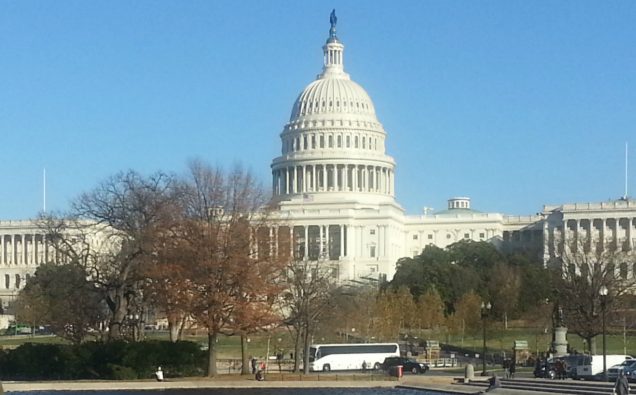
A bipartisan resolution introduced in the US House of Representatives has rejected India’s repressive tactics in Kashmir since August 5 revocation of the disputed region’s autonomy and asked New Delhi to lift all restrictions on communication and freedom of expression.
Congresswoman Pramila Jayapal, a Democrat from Washington State, and Congressman Steve Watkins, a Republican from Kansas, have submitted Resolution 745 with the House Foreign Affairs Committee.
The resolution is non-binding but reflects growing concern on Capitol Hill over blanket lockdown of Kashmir, which has been deprived of its autonomous status, and which Prime Minister Narendra Modi’s government says is now part of the Indian Union.
In the resolution, the two lawmakers recognize India’s security concerns but make clear that a spate of measures that New Delhi has resorted to are out of proportion.
Yesterday, I introduced a bipartisan House Resolution with @Rep_Watkins to urge the Indian government to end restrictions on communications and mass detentions in Jammu and Kashmir as swiftly as possible and preserve religious freedom for all residents. https://t.co/OcR5qwQeUy
— Rep. Pramila Jayapal (@RepJayapal) December 8, 2019
Kashmir – a UN-recognized disputed territory – has been the underlying cause of conflict between India and Pakistan, who both partly control the region.
Modi has defended the decision to annual autonomy of Kashmir by saying its formal inclusion in India would help bring economic development. Pakistan Prime Minister Imran Khan has strongly condemned the Indian move as annexation and fascist. The region has been in the grip of insurgency for more than two decades with periods off relative quiet but Kashmiri tensions have always been a nightmarish trigger for South Asia since India and Pakistan are nuclear-armed and influence events in the region. India accuses Pakistan of backing militants in Kashmir and calls them terrorists. Islamabad has rejected the charge and accused New Delhi of perpetrating state terrorism on Kashmiris. PM Khan has also on several occasions appealed to the people of Kashmir on the Pakistani side to not joint militancy across the Line of Control in Indian-administered Kashmir.
Meanwhile, Kashmiris have also protested the Indian moves despite strict restrictions stifling political dissent.
Before formal submission of the resolution, Indian-Americans ran a campaign to stop Jayapal – who is of Indian origin and a vocal critic of Indian repression in Kashmir – from making the move, and after its introduction condemned her for what many called an anti-India stance.
The resolution explicitly lists out many issues violative of human rights and urges to “lift the remaining restrictions on communication and to restore internet access across all of Jammu and Kashmir as swiftly as possible; refrain from the use of threats and excessive force against detained people and peaceful protesters; swiftly release arbitrarily detained people in Jammu and Kashmir; refrain from conditioning the release of detained people on their willingness to sign bonds prohibiting any political activities and speeches.”
Since abolishing the region’s autonomy on August 5, India has banned entry of foreign journalists and observers into the territory.
The resolution particularly asks New Delhi to “allow international human rights observers and journalists to access Jammu and Kashmir and operate freely throughout India, without threats.”
The two lawmakers also “condemn, at the highest levels, all religiously motivated violence, including that violence which targets against religious minorities.”
The resolution urges India to “end the restrictions on communications and mass detentions in Jammu and Kashmir as swiftly as possible and preserve religious freedom for all residents.”
The resolution “recognizes the dire security challenges faced by the Government and India in Jammu and Kashmir and the continuing threat of state-supported cross-border terrorism.”
But it categorically “rejects arbitrary detention, use of excessive force against civilians, and suppression of peaceful expression of dissent as proportional responses to security challenges;
It “urges the Government of India to ensure that any actions taken in pursuit of legitimate security priorities respect the human rights of all people and adhere to international human rights law.”
Laying out the background that justify the resolution, the authors of the move make note of the sweeping arrests – more than 3,800 people between August 5 and September 6 with 2,600 released. It points out that several prominent political and business leaders remain in detention.
The resolution also cites Jammu and Kashmir police as acknowledging that 144 children, as young as 9 years old, have been arrested;
“Indian authorities have used the Public Safety Act to preventatively detain people for a broad range of activities that are vaguely defined and without charge for up to 2 years in some cases, including human rights defenders, journalists, political leaders, and people involved in protests,” the resolution notes.
India’s Public Safety Act violates article 9(2) of the International Covenant on Civil and Political Rights by allowing authorities to not communicate grounds of detention for up to 10 days of detention, and also to withhold any information considered “to be against the public interest to disclose,” it says.
Besides, the resolution refers to practices like “photographic evidence indicates that detained people have been required to sign surety bonds forbidding them from making statements or participating in political activities as a condition of their release.”
It also says the Department of State reports that the security situation in Jammu and Kashmir remains dire, with insurgents and terrorists threatening the lives of civilians, armed forces, police, and government officials.
















